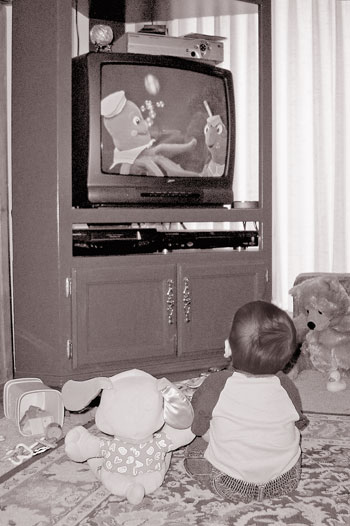|
High time to stop being adicted to the TV:
Alarm bells are ringing
by Lakmal Welabada
Little Binuri was with the newest story book 'Thammbelina' which she
got as a gift from her mother. Her mother phoned her that afternoon and
asked Binuri to get the story read by her grandparents as she was
getting late to come home from office.
Binuri, the six-year-old was at the centre of the sitting room. Her
grandparents, young spinster aunt and bachelor uncle and maid were
around her. All of them were fully engrossed in the Sinhala dubbed
Indian teledrma shown on TV.

Binuri waited patiently watching how the lady on Tv was carrying on
with her paramour. Binuri wondered why the teenage Akki in the next
programme was crying so hard and then ran away with her 'boy' friend.
Binuri sensed that Akki's parents didn't like the boy. 'Is this the
solution when the parents or elders are not in favour of what we, the
young do?' she wondered.
TV programs, especially the chain of non-ending teledramas have begun
to play a big role in the day-to-day life of Sri Lanka now. Most of the
TV programs shown in Sri Lanka are not meant for a particular age group.
Moreover, they are considered the best significant source of
entertainment by the upper and middle class society of the country.
Apart from its entertainment capability, many learned people
including sociologists point out the distortion caused by TV. This
especially affect children and hinders interaction among family members.
Dr. Chandana Jayaratne of the Department of Physics of the University
of Colombo once explained the Ice Berg theory of Sygmond Freud. The
percentage of the subconscious of a child's mind (super ego) is larger
than his conscious (ego). The ego helps one to argue on something and
come to a better conclusion.
When it's not functioning they get hyptonised to whatever they are
exposed, and that goes deep into their super ego and gets inculcated.
This is what happens in a child's mind as generally the function of the
ego of a child that is below the age of 12 years is less than his super
ego.
And that's why a child has a limited skill of arguing. By 12-13
years, he begins to talk back as his ego starts to function. Hence when
a child below 12 years gets exposed to vulnerabilities of any kind (it
can be mild or vigorous) he is supposed to have implanted them in his
ego and which he would activate later in life.
As an example we'll think you scared a child over using a knife
thinking of her own safety. But once she grows up and starts her lessons
at home science class, she would show a phobia to use a knife.
Likewise both the picturesque and moraly uplifting as well as
demoralising incidents shown in the 'magic box' would definitely have a
greater effect than we expect in a child's mind and personality.
Dr. Iresha Karunaratne, Lecturer of the Sociology Department of the
University of Colombo has this to say about the effect of TV in
present-day Sri Lanka.
"We cannot deny the fact that TV is a big source of entertainment. As
a sociologist, my opinion in general is, whatever the TV programme and
the channel you watch, it has replaced many things in your life. You
waste the golden time that you should use to talk and understand your
children's feelings.
As a result the bond and the link between the two parties would get
either distanced, split or broken. This would affect teenage children
the most" explains Dr. Karunaratne.
Why do you let the TV consume your time?... the time you will never
ever get back. The alarm is already ringing and it's high time to wake
up from the 'day and night' hypnotism of the TV.
[email protected]
|
